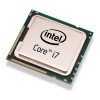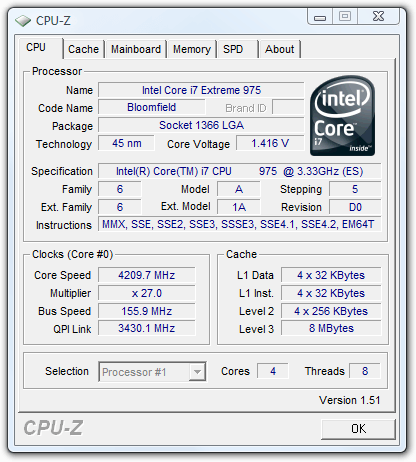- Qualcomm Launches Snapdragon 4 Gen 2 Mobile Platform
- AMD Launches Ryzen PRO 7000 Series Mobile & Desktop Platform
- Intel Launches Sleek Single-Slot Arc Pro A60 Workstation Graphics Card
- NVIDIA Announces Latest Ada Lovelace Additions: GeForce RTX 4060 Ti & RTX 4060
- Maxon Redshift With AMD Radeon GPU Rendering Support Now Available
Intel Core i7-975 Extreme Edition

It’s been a good seven months since the launch of the original Core i7 processors, so isn’t it about time we got to see some new models? Don’t fret, as Intel has just announced their i7-950 3.06GHz mid-range and i7-975 3.33GHz high-end models. We’re taking a look at the latter today, so let’s see how it compares to its predecessor.
Page 11 – Overclocking Intel’s Core i7-975 Extreme Edition
Before discussing results, let’s take a minute to briefly discuss what I consider to be a worthwhile overclock. As I’ve mentioned in past content, I’m not as interested in finding the highest overclock possible as much as I am interested in finding the highest stable overclock. To me, if an overclock crashes the computer after a few minutes of running a stress-test, it has little value except for competition.
How we declare an overclock stable is simple… we stress it as hard as possible for a certain period of time, both with CPU-related tests and also GPU-related, to conclude on what we’ll be confident is 100% stability throughout all possible computing scenarios.
For the sake of CPU stress-testing, we use IntelBurnTest, for reasons I’ve laid out in a recent forum thread. Compared to other popular CPU stress-testers, IBT’s tests are far more gruelling, and proof of that is seen by the fact that it manages to heat the CPU up to 20°C hotter than competing applications, like SP2004. Also, despite its name, IntelBurnTest is just as effective on AMD processors. Generally, if the CPU survives the first half-hour of this stress, there’s a good chance that it’s mostly stable, but I strive for a 12 hour stress as long as time permits.
If the CPU stress passes without error, then GPU stress-testing begins, in order to assure a system-wide stable overclock. To test for this, 3DMark Vantage’s Extreme test is used, with the increased resolution of 2560×1600, looped nine times. If this passes, some time is dedicated to real-world game testing, to make sure that gaming is just as stable as it would be if the CPU were at stock. If both these CPU and GPU tests pass without issue, we can confidently declare a stable overclock.
Overclocking Intel’s Core i7-975 Extreme Edition
Due to various factors (namely Computex), I didn’t spend as much time overclocking the i7-975 as I would have liked, although it took me no time whatsoever to hit an amazing clock. As I’ve mentioned in many other CPU reviews, a huge limiting factor for me is overclocking in a warm room, and as you’d imagine, heat doesn’t go too well with that.
Normally I like to show a fully 100% stable overclock, but given the temps I received, it’s really difficult to keep temperatures in check even at 3.6GHz. However, from what I’ve seen at Computex thus far, 4.0GHz stable is not an unreachable goal on the i7-975, not by a long-shot.

The overclock you see above is the absolute first one that I tried, and when it successfully booted into Windows, I almost dropped my jaw. Even more surprising was benchmarking Cinebench and 3DMark Vantage many times over, only to retain full OS stability.
After some investigation, it turns out that the CPU was indeed throttling due to temperatures, and in Cinebench, the CPU would drop down to around 4.0GHz, whereas with a more robust benchmark like LinX, it’d drop to 3.7GHz. Even at 3.7GHz however, it was completely stable with LINPACK testing for hours, and that in itself is impressive.
It’s been rumored that Intel made minor changes to the i7-975 to improve overclocking, but it’s hard to say for sure without touching many different samples. From my overclock above, however, I’d be willing to believe that it’s true.
Support our efforts! With ad revenue at an all-time low for written websites, we're relying more than ever on reader support to help us continue putting so much effort into this type of content. You can support us by becoming a Patron, or by using our Amazon shopping affiliate links listed through our articles. Thanks for your support!





